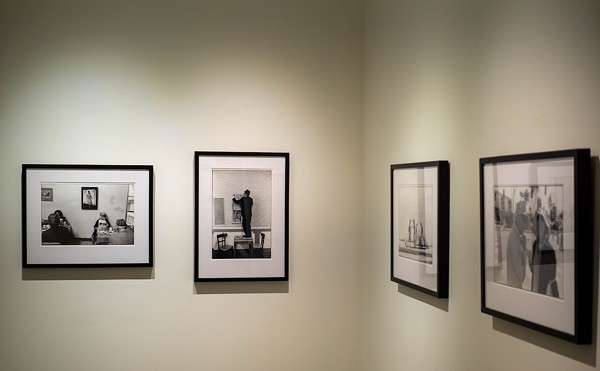
The most remarkable thing about 2.5 Minute Ride is Lisa Kay Powers’ splendid acting. Powers, once a regular at American Stage (and for a short times its artistic director), delivers as near perfect a performance in this one-woman show as you can hope to see anywhere, and I’m including New York and London and Mars.
As “Lisa” (author Lisa Kron), Powers is formidable, funny, tender, imposing, heart-rending, and just plain definitive. Like Meryl Sreep, she commands your respect within moments, and like Cate Blanchett, she always seems more complex than words can express. Walking among the 15 chairs of all types on Jerid Fox’s simple set, using a laser pointer to pretend that there are slide projections on empty screens, Powers reminds us at all moments how very deep human personality is, how resistant to easy categories, how luminous and mysterious. If the memories that Ride offers us don’t pay off at the end, if Kron’s logic implicitly promises a higher synthesis that never comes, it’s a small disappointment in an evening that delivers such powerhouse acting. Let’s hope Powers is back for good, and let’s watch her play everyone.
Ride is based on a gambit: that two widely disparate stories can come to comment on each other, illuminate each other, and body forth a man. That man is Kron’s father, a refugee from Nazi Germany who for a time was a U.S. Army interrogator, and whose own parents were murdered at Auschwitz. Lisa speaks of two trips with him — one to visit the death camp in Poland where his parents were killed; and the other to the Cedar Point Amusement Park in Ohio, featuring a particularly harrowing roller coaster called The Mean Streak (to which the title refers).
Kron’s text is exceedingly intelligent and, where appropriate, emotionally urgent. Switching from one story to the other, we hear about her father’s love of harrowing carnival rides, and then about the horrors of the Birkenau sub-camp, with its rooms full of human hair, of eyeglasses, of valises. We hear her father wonder aloud if he too might have become a Nazi under different conditions, and we hear Kron comment on the question of what to call her female lover at an Orthodox Jewish wedding.
There are digressions concerning other family members, Polish food, a Dutch exchange student, and Meijer’s Thrifty Acres, the store that has everything in Lansing, Michigan. There are moments when Lisa, stunned at her inability to conjure Auschwitz, seems to stop the whole play. And there’s always that suggestion, that inference that soon these strands will come together in one super-meaningful convergence…
It doesn’t happen. There’s another problem, too: as directed by Todd Olson (who manages wonderfully with Powers in the flesh), a second woman records the whole monologue with a video camera, with the result projected onto a wall at many times the actress’ size. The implication is that the show is about Lisa and not her father — this message runs counter to the text — and, further, that what we’re witnessing is just the usual performance artist narcissism (my life is so fascinating I had to act it and record it). Still, if you can ignore Powers’ video self, you’ll find the flesh-and-blood actress abundantly capable of holding the stage, and her subject — her beloved father — larger than life in his own way. He seems a fascinating figure, even if his contradictions remain unresolved.
In sum: don’t miss 2.5 Minute Ride, and the performance by Powers. This is inspired acting, and reason for excitement. A missing luminary has just returned, oh so brightly, to the Bay area.
The world of Keith Huff’s provocative play A Steady Rain is a moral jungle, a confused landscape of missed connections, botched intentions, corruption, violence, racism and treachery. It’s a place where children might be found carrying guns, where your best friend has sexual designs on your wife, where the difference between the good guys and the bad guys is a matter of degree only.
Maybe that’s what the rain of the title symbolizes: an unceasing, relentless cascade of error and betrayal, a blanket of trouble so thick you can’t see an inch in front of you. That the play ostensibly takes place in Chicago, that it’s superficially about two good friends, Joey and Denny, isn’t the point: the point is this downpour of cruelty and ignorance that threatens to flood everything. You may argue that in fact, things aren’t really this bad, at least not for everyone. But you’d be lying if you claimed there’s not a scent of it in the air, the sense of this storm just around the corner and down the block. You want proof, just read the newspaper. These rainclouds have been sighted not far from your neighborhood.
Denny and Joey are policemen, friends since kindergarten, who keep getting passed over for promotion to detective. Joey’s a recovering alcoholic, living alone in a fleabag apartment; Denny’s a husband and father who takes money from prostitutes and in turn protects them from pimps and the law. Denny’s a proud racist; Joey is trying to think himself to political correctness.
One night Joey is at Denny’s house, and someone fires a shot through the plate glass window, wounding Denny’s 2-year-old son. The infant’s rushed to the hospital, and there’s concern he may have brain damage. Denny wants revenge. He suspects a pimp named Walter Lorenz, who’s angry at him for messing with a prostitute named Rhonda. But Denny’s search for the shooter results in the death of a probably innocent man during a car chase in the rain, and to make matters worse, Denny and Joey get suspended from the force for turning a Vietnamese kid over to a stranger who turns out to be a serial murderer/cannibal.
Meanwhile, Joey is repeatedly finding himself alone with Denny’s wife, and something illicit is developing. As Denny continues his search for the man who shot his 2-year-old, Joey allows himself to give way to his feelings for Denny’s wife, and there’s more violence, more betrayal — in a single word, chaos. And then things really go wrong. Call it bad weather.
The two actors who play the old friends are superb. As Joey, Drew DeCaro is an emotional man who’s aware of his weaknesses, and trying — somewhat — to reform himself. DeCaro manages to show us Joey’s great loyalty to Denny while at the same time convincing us that the adultery with Denny’s wife developed in all innocence. Justin Campbell as Denny is hard-boiled, bitter, dangerous; yet he’s clearly committed to the childhood friend whom he only beats up on occasion.
With little but a table and a couple of chairs on Jerid Fox’s set, these two men, beautifully directed by T. Scott Wooten, create not just an atmosphere but a world. Darkly clothed by Adrin Erra Puente, they stand for all the murky, muddled reasoning that passes for knowledge in a difficult time.
Whether addressing us or each other, only one thing is always clear: they don’t have a clue as to their story’s real meaning.















